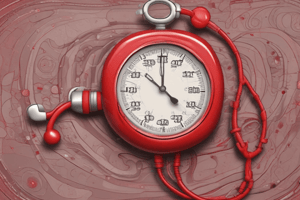Podcast
Questions and Answers
What is the target organ affected by hypertension that can lead to renal failure?
What is the target organ affected by hypertension that can lead to renal failure?
- Kidney (correct)
- Heart
- Brain
- Eye
Which of the following is a complication of hypertension affecting the brain?
Which of the following is a complication of hypertension affecting the brain?
- Stroke or TIA (correct)
- Acute renal failure
- Hypertensive retinopathy
- Aortic dissection
What is the term for rapid rise of BP >220/120 mm Hg, with target organ damage?
What is the term for rapid rise of BP >220/120 mm Hg, with target organ damage?
- Malignant hypertension
- Hypertensive emergency (correct)
- Hypertensive urgency
- Accelerated hypertension
What investigation is done to evaluate the cardiac complications of hypertension?
What investigation is done to evaluate the cardiac complications of hypertension?
What is the term for rapid rise of BP >220/120 mm Hg, without target organ damage?
What is the term for rapid rise of BP >220/120 mm Hg, without target organ damage?
What is the gold standard for measuring blood pressure?
What is the gold standard for measuring blood pressure?
Which of the following is a variable that may affect BP?
Which of the following is a variable that may affect BP?
What is the correct way to support the patient's arm during blood pressure measurement?
What is the correct way to support the patient's arm during blood pressure measurement?
What should be done to the patient before measuring blood pressure?
What should be done to the patient before measuring blood pressure?
What should be done to the cuff during blood pressure measurement?
What should be done to the cuff during blood pressure measurement?
Flashcards are hidden until you start studying
Study Notes
Causes of Hypertension
- Renal causes: Diabetic nephropathy, Pyelonephritis, Polycystic kidney, Analgesic nephropathy
- Renovascular causes: Renal artery stenosis, Endocrinal hypertension
- Endocrinal causes: Pituitary (Acromegaly), Thyroid (Hypothyroidism, Hyperthyroidism), Parathyroid (Hyperparathyroidism), Suprarenal gland (Conn's syndrome, Cushing's syndrome, Pheochromocytoma)
- CNS, Vascular, Iatrogenic causes: CNS (↑ intracranial tension, Medullary lesions), Vascular (Polyarteritis nodosa, Coarctation of aorta), Iatrogenic (Contraceptive pills, Cortisone, Catecholamines, Calcium, Cabenoxolone, Cyclosporine, NSAIDs, Erythropoeitin)
- Pregnancy: Preeclampsia/ eclampsia
- Blood: Polycythemia (hyperviscosity)
- Obstructive Sleep Apnea: Loud snoring, Witnessed apnea, Excessive daytime somnolence
Symptoms of Hypertension
- Asymptomatic in most cases (Silent Killer)
- May be discovered accidentally
- Headache (occipital), Chest pain, Nocturia, Nausea, vomiting, tinnitus, blurring of vision, epistaxis
- Symptoms of cause
- Symptoms of complications
- Signs of hypertension: BP > 140/90 mm Hg, Signs of cause, Signs of LV hypertrophy, Pulsating aortic area with dilated aorta
- Cardiac auscultation: ↑S1 (muscular component), ↑S2 (close or reversed splitting of S2), S3 gallop (LVF), S4 gallop (diastolic dysfunction), Ejection click, Soft ejection systolic murmur, Early diastolic murmur (dilated aortic root)
Definition and Staging of Hypertension
- Definition: Persistent elevation of arterial BP > 140/90 mm Hg
- Staging of office blood pressure: three stages
Types of Hypertension
- Primary (essential, idiopathic) hypertension: About 95% of cases, no known causes, starts between 35-55 years, family history is usually positive, predisposing factors: Genetic, obesity, stress, salt sensitivity, smoking
- Secondary (curable) hypertension: About 5% of cases, known underlying cause, starts before 25 and after 55 years, negative family history, rapidly progressive with early complications
Theories of Primary Hypertension
- Sympathetic overactivity
- Activation of renin-angiotensin aldosterone system
- Increased adrenal gland activity → ↑ aldosterone activity
- Hyperinsulinemia due to peripheral insulin resistance
- ↓ atrial natriuretic peptide (ANP)
- Baroreceptor re-seting
- Multifactorial theory: Strss → ↑ sympathetic → renal ischemia → ↑ renin → ↑ aldosterone → ↑ BP
Complications of Hypertension
- Target organs affected: Kidney (renal failure), Heart (LVH, heart failure), Brain (stroke or TIA), Eye (hypertensive retinopathy), Arteries (atherosclerosis, aortic dissection)
- Acute complications: Cerebral stroke, hypertensive encephalopathy, subarachnoid hemorrhage, acute pulmonary edema, dissecting aneurysm, acute coronary syndromes, acute renal failure, hypertensive crises
Investigations of Hypertension
- For etiology: as secondary hypertension
- For complications: Cardiac (ECG, CXR, ECHO), Cerebral (CT, MRI brain), Renal (urinalysis, renal function, renal imaging)
Measurement of BP
- Variables that may affect BP: Eating, Emotion, Exercise, Exposure to cold, Empty or full bladder, Smoking, Sympathomimetics (cold remedies)
- Blood Pressure Measurement: Sphygmomanometer, Systolic pressure = pressure when 1st sound is heard, Diastolic pressure = pressure when last sound is heard
- Blood Pressure Cuff Size: Small – children and small adults, Average, Large – overweight and large adults
- Types of sphygmomanometers: Mercury, Aneroid, Automatic (Electronic/Digital)
Studying That Suits You
Use AI to generate personalized quizzes and flashcards to suit your learning preferences.




